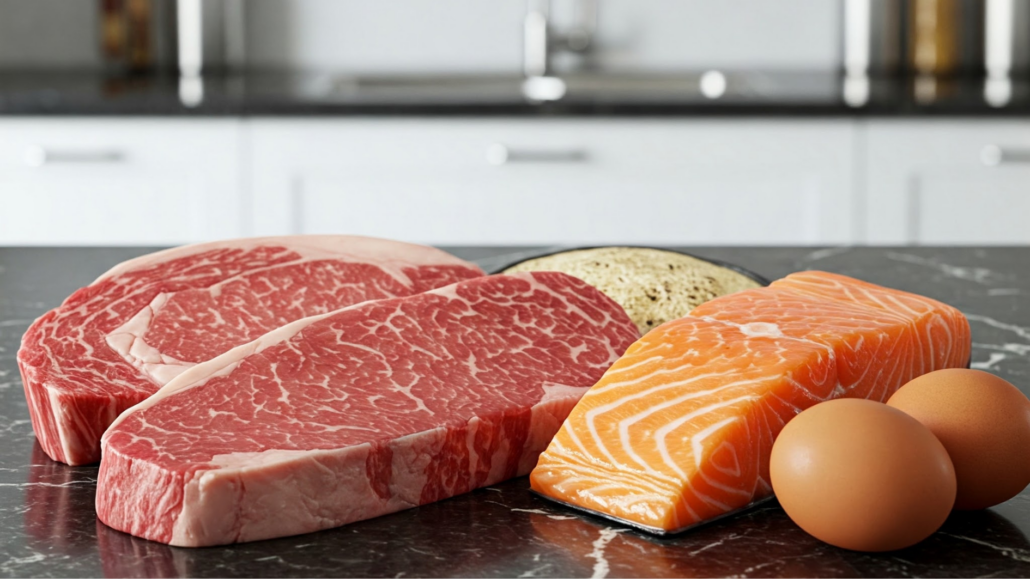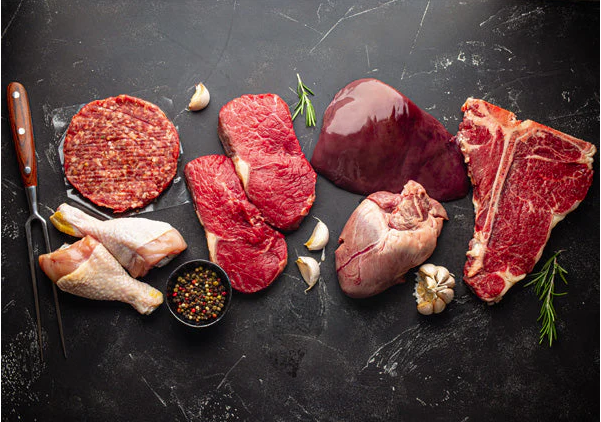We include products in articles we think are useful for our readers. If you buy products or services through links on our website, we may earn a small commission.
7 Carnivore Diet Myths: Debunked
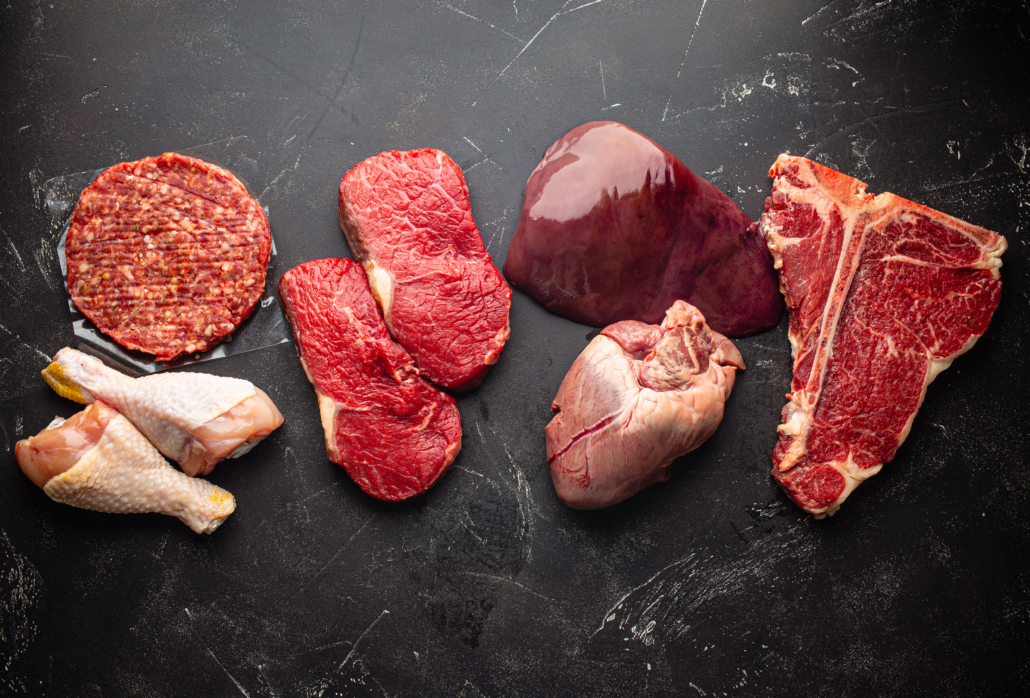
The carnivore diet has emerged as both a beneficial diet and lifestyle intervention and a focus of contention. Enthusiasts praise its simplicity and power to overcome seemingly intractable ailments, while skeptics worry about the effects of cutting out the plant foods we’ve been told are healthy, and increasing the animal products we’ve been told are bad for us. With such a radical departure from the mainstream nutritional narrative, myths, and misconceptions can cloud the true essence of the carnivore diet.
In this article, we’ll separate fact from fiction as we debunk common carnivore diet myths and shed light on the science behind this ancestral eating regimen.
Table of Contents
Myth 1:The carnivore diet is nutritionally deficient
The myth that cutting out plant foods and consuming only animal products causes nutrient deficiencies is alarmingly prevalent and disturbingly wrong.
You can only believe it if you’ve been grossly misled about both the unsurpassed abundance of nutrients in meat and the paltry nutrients in most plant foods.
Animal products, including red meat, seafood, organ meats, and full-fat dairy, are the most nutrient-dense food on earth!
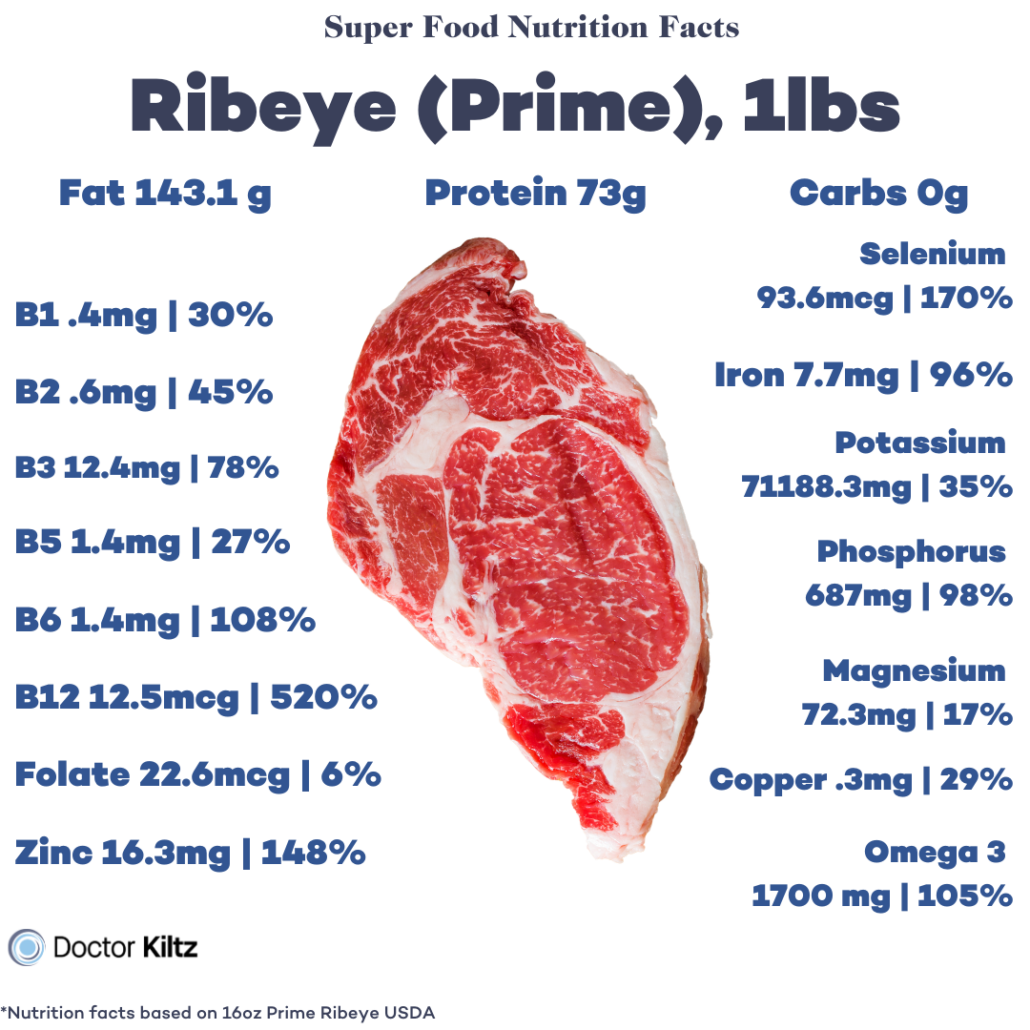
Animal products provide essentially every macro and micronutrient you need to thrive in near-perfect proportions and in their most bioavailable (useable) forms. In fact, there are numerous essential nutrients that are found only in meat.
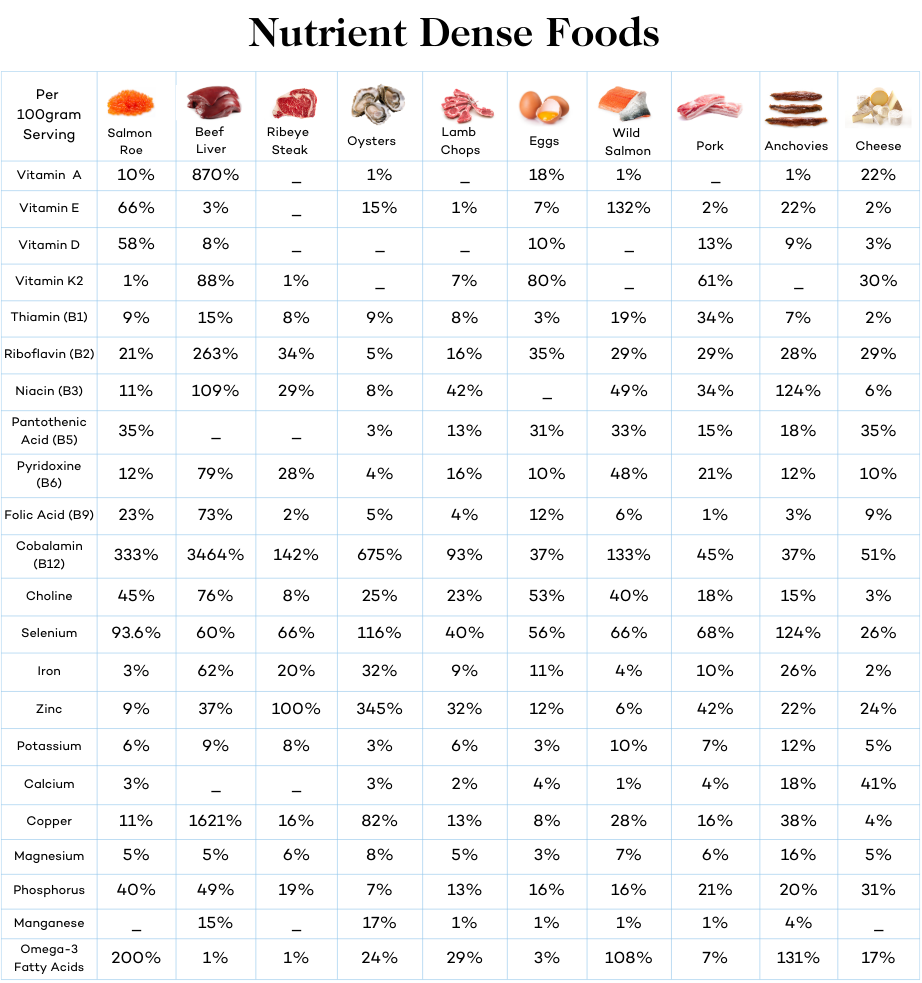
The same cannot be said for plant foods. Despite the “balanced diet” dogma, from a nutritional perspective, plants are completely non-essential. Animal-based foods provide so much more than the fat and protein that most people think of.
| APPLE (100 g) | CARROTS (100 g) | RED MEAT (100 g) | BEEF LIVER (100 g) | |
| Calcium | 3.0 mg | 3.3 mg | 11.0 mg | 11.0 mg |
| Phosphorus | 6.0 mg | 31.0 mg | 140.0 mg | 476.0 mg |
| Magnesium | 4.8 mg | 6.2 mg | 15.0 mg | 18.0 mg |
| Potassium | 139.0 mg | 222.0 mg | 370.0 mg | 380.0 mg |
| Iron | .1 mg | .6 mg | 3.3 mg | 8.8 mg |
| Zinc | .05 mg | .3 mg | 4.4 mg | 4.0 mg |
| Copper | .04 mg | .08 mg | .18 mg | 12.0 mg |
| Vitamin A | None | None | 40 IU | 53,400 IU |
| Vitamin D | None | None | Trace | 19 IU |
| Vitamin E | .37 mg | .11 mg | 1.7 mg | .63 mg |
| Vitamin C | 7.0 mg | 6.0 mg | 16 mg | 27.0 mg |
| Thiamin | .03 mg | .05 mg | .05 mg | .26 mg |
| Riboflavin | .02 mg | .05 mg | .20 mg | 4.19 mg |
| Niacin | .10 mg | .60 mg | 4.0 mg | 16.5 mg |
| Pantothenic Acid | .11 mg | .19 mg | .42 mg | 8.8 mg |
| Vitamin B6 | .03 mg | .10 mg | .07 mg | .73 mg |
| Folate | 8.0 mcg | 24.0 mcg | 4.0 mcg | 145.0 mcg |
| Biotin | None | .42 mcg | 2.08 mcg | 96.0 mcg |
| Vitamin B12 | None | None | 1.84 mcg | 111.3 mcg |
Myth 2: Eating meat is bad for your heart
As a source of saturated fat, animal products have been victimized by a false association between saturated fat and heart disease.
To undo this myth, we need not look any further than the most recent and highest-quality mainstream studies.
Let’s begin with the fact that there are no, as in zero, randomized control trials linking the consumption of fresh meat with heart disease.
A bellwether 2020 systemic review (the gold standard of nutritional research) published in the prestigious Journal of the American College of Cardiology concluded, “Although intake of processed meat has been associated with increased risk of CHD (coronary heart disease), intake of unprocessed red meat is not, which indicates that the saturated fat content of meat is unlikely to be responsible for this association.”
The researchers affirm that animal products, including, “Whole-fat dairy, unprocessed meat…are SFA-rich foods with a complex matrix (of nutrients) that are not associated with increased risk of CVD. The totality of available evidence does not support further limiting the intake of such foods.”
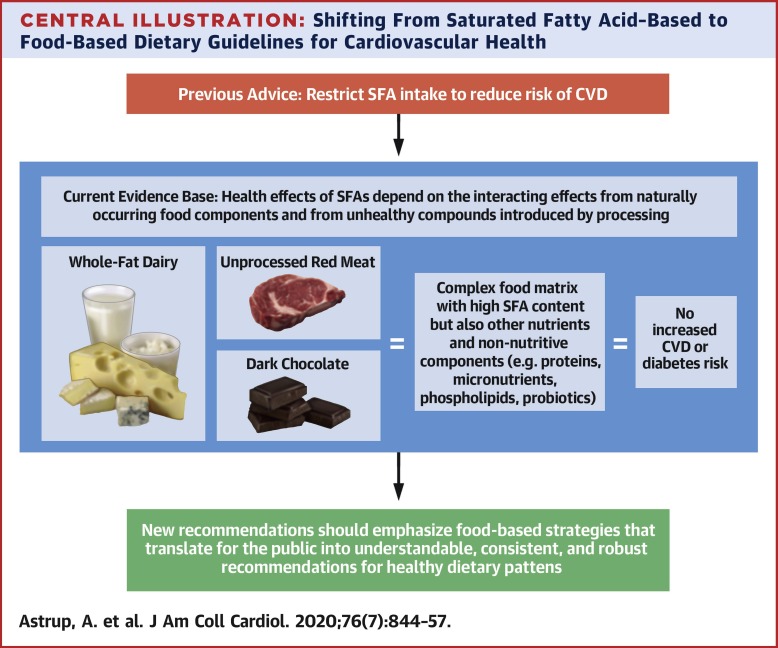
Another systematic review from 2015 analyzed data from 15 randomized controlled trials that included over 59,000 participants. Researchers found that reducing saturated fat had no impact on heart attacks, strokes, and all-cause mortality.
A 2010 meta-analysis of twenty-one studies with nearly 350,000 participants and a follow-up period of 5-23 years yielded similar results. The study authors stated, “There is no significant evidence for concluding that dietary saturated fat is associated with an increased risk of CHD or CVD. More data are needed to elucidate whether CVD risks are likely to be influenced by the specific nutrients used to replace saturated fat.”
By “specific nutrients,” the authors are referring to sugar and partially unsaturated (PUFA) seed “vegetable” oils. Numerous studies implicate these plant foods as key factors in heart disease.
Myth 3: Eating red meat causes cancer
One of the most pernicious myths about the carnivore diet is that eating so much red meat will cause cancer. But as with heart disease, the link between fresh meat and cancer is bologna. Let’s follow the science.
A 2015 analysis found that red meat had no relationship with colon cancer, even when including consideration of cooking methods and other mitigating factors. This is significant because some forms of cooking, such as grilling, can produce compounds thought to be carcinogenic. But in this study, even grilled meat didn’t affect cancer risk.
A 2011 meta-analysis of 25 studies found insufficient evidence to support an association between red meat and colon cancer–the most common cancer attributed to eating red meat.
A major 2019 review of 73 other studies concluded, “The possible absolute effects of red and processed meat consumption on cancer mortality and incidence are very small, and the certainty of the evidence is low to very low.”
An interesting 2018 study found that there was no difference in the rates of colorectal cancer between vegetarians and people who consumed red meat. This comparison is significant because if red meat did cause cancer, you’d expect people who didn’t eat meat to experience a positive effect. But that’s not the case.
A large-scale review of 8 Asian studies with over 300,000 participants and follow-up periods ranging from 6 to 15 years found that “Red meat intake was inversely associated with CVD mortality in men and with cancer mortality in women in Asian countries.” In other words, red meat intake was found to reduce deaths by cancer in women.
A word of warning: though red meat itself is not linked to cancer, the foods that you consume alongside red meat can activate elements of red meat as carcinogens. For example, in a 2004 study, consuming meats that were high in heme iron (beef and blood sausage) was found to increase cancer risk when consumed with high PUFA corn and soybean oil.
Vegetable oils are strictly prohibited on the carnivore diet so you won’t have this issue.
Myth 4: The carnivore diet is bad for the environment
Perhaps the most strident myth about the carnivore diet is that eating lots of meat is bad for the environment. But the reality is that the impacts of animal livestock on the environment are, in many cases, remarkably misrepresented.
Let’s take, for example, the purported greenhouse effects of methane produced by cattle. U.C. Davis researcher Frank Mitloehner explains that methane from cows ought to be analyzed differently than the greenhouse gases emitted into the atmosphere through burning fuels that have been unlocked from the earth.
Methane from cows is part of a natural carbon cycle: Cows eat grass (a form of carbon). Bacteria in the cows’ stomach ferments the grass. Methane is expelled as a byproduct of cow digestion.
After 10 years in the atmosphere, the methane produced by cows breaks back down into water and carbon dioxide. These elements are returned to the earth through photosynthesis. Then cows eat the grass, and the “closed” system cycles on.
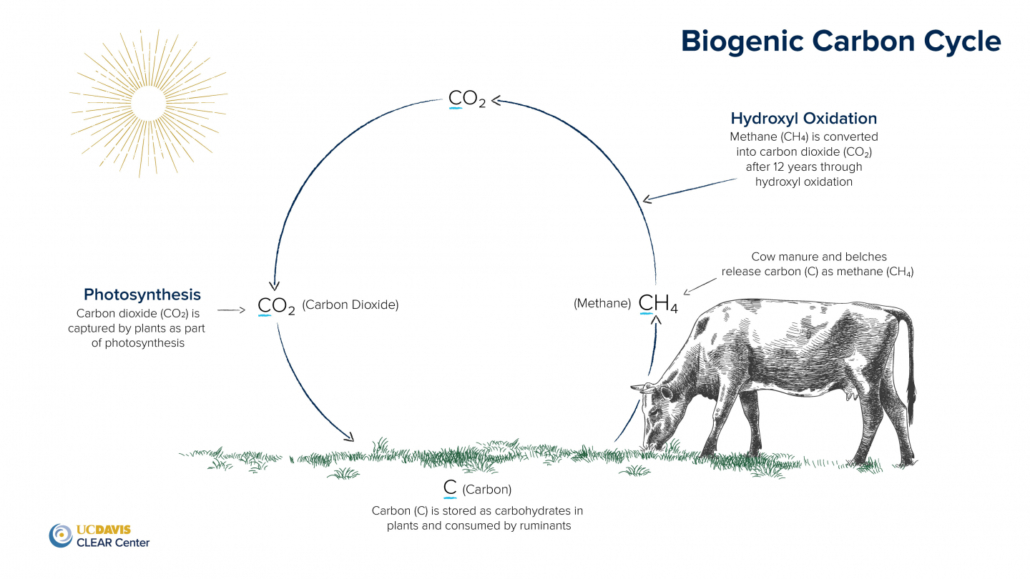
Source: University of California-Davis CLEAR Center
Even though methane from fossil fuels and living organisms like cows are chemically identical, they have a different warming impact.
Carnivore dieters who are concerned about their impact on the environment can select meat raised with “regenerative agricultural practices” and “carbon farming.” These ranching methods actually pull carbon out of the atmosphere and sequester it in soils, improving soil health.
But even conventional animal agriculture is not the menace to the environment that it’s made out to be. An International Atomic Energy Agency report revealed that until 2003 it incorrectly believed increasing livestock numbers were associated with increasing atmospheric methane levels. When, in fact, there was no relationship between increasing populations of ruminant animals and changes in atmospheric methane.
Likewise, A 2018 NASA report found that atmospheric methane has risen sharply since 2006. However, this increase was attributable to emissions from oil and gas production and microbial production in rice paddies and marshes, but not from livestock.
You can learn more about the real impacts of meat on the environment here.
Myth 5: The carnivore diet doesn’t have enough fiber
Fiber is a type of indigestible carbohydrate found in plant foods. Meat doesn’t have fiber, making the carnivore diet an essentially no-fiber diet.
This scared people who think of fiber as a kind of pipe cleaner, without which they won’t poop. But this is a misconception.
Ironically, many people report using the carnivore diet to successfully overcome digestive issues like IBS, in large part due to the elimination of fiber.
Not surprisingly, research shows that the more fiber people eat, the greater the risk of developing diverticular diseases.
A study published in the World Journal of Gastroenterology analyzed data from all the studies over the previous 35 years investigating the link between fiber and colon health. The authors concluded, “A strong case cannot be made for a protective effect of dietary fiber against colorectal polyp or cancer. Neither has fiber been found to be useful in chronic constipation and irritable bowel syndrome. It is also not useful in the treatment of perianal conditions. The fiber deficit-diverticulosis theory should also be challenged…we often choose to believe a lie, as a lie repeated often enough by enough people becomes accepted as the truth. We urge clinicians to keep an open mind. Myths about fiber must be debunked and truth installed.”
Though fiber has been shown to reduce cholesterol and control blood sugar, neither of these effects is necessary for most people practicing a carnivore diet. For one, cholesterol is not a good measure of heart disease risk. And two, blood sugar control is not an issue on a very low-carb diet.
Myth 6: The carnivore diet is boring
For many carnivore dieters, a juicy ribeye steak is simply never boring. You can always experiment with toppings like smothering it in blue cheese or topping it with pan-fried duck liver.
For people who need variety to stave off borden, there are dozens of delicious meats to explore, including nutrient-dense organ meats.
Boring is in the eye of the beholder–and most people consuming a standard American diet get their calories from a few toxic ingredients mixed and matched into various junk foods like pizza, pasta, and baked goods.
The truth is the carnivore diet motivates people to get creative by selecting and preparing various animal products.
And the payoff in terms of health benefits like increased libido, better mood, mental clarity, resolution of various autoimmune disorders, and greater stamina and energy, is anything but boring.
Even breakfast on the carnivore diet can be an opportunity to try a bevy of interesting recipe ideas.
Myth 7: The carnivore diet is expensive
Meat isn’t cheap, but neither is junk food. In fact, the real myth is that people eat processed food because it’s cheap.
The reality is that people eat processed food because it is engineered to be addictive and it’s prepackaged, making it dangerously convenient. On the other hand, animal-based carnivore diet foods are extremely satiating.
If you’re on a budget, you might be surprised at how many nourishing nutrient-dense animal meals you can get out of less than $100.
Here’s a chart comparing the costs between processed foods and carnivore diet foods as of 2023
| Processed Junk | Cost | Whole Carnivore Food | Cost |
| 14.5 oz package of Oreos | $9.99 | 16 oz. 73/27 Ground Beef | $3.96 |
| 12 pack of coca cola | $13.50 | 32 oz heavy whipping cream | $4.98 |
| 18 oz Honey Nut Cheerios Cereal | $6.80 | 24 Kirkland Signature Eggs Eggs | $5.79 |
| 14.5 oz Doritos | $5.50 | 16 oz. Great Value Thick Cut Bacon | $4.24 |
| 2 x 22 oz Digriorno Stuffed Crust Pizza | $21.00 | 32 oz. USDA Choice Top Sirloin Steak | $26.99 |
| 27 oz. Pop Tarts | $5.00 | 16 oz Murry’s Dansk Blue Cheese | $6.00 |
| 89 oz. Tropicana Orange Juice | $7.00 | 24 oz pork belly | $6.80 |
| 1 Gallon skim milk | $3.25 | 1 lb Sweet cream butter | $3.98 |
| 18 oz. club crackers | $4.98 | Kerry Gold Cheese | $5.28 |
| 48 oz. Bryers Ice Cream | $4.97 | 2 Cans of Sardines in water | $2.24 |
| Bagle Bites Party Size | $13.00 | 1 lb Fresh Atlantic Salmon | $10.68 |
| TOTAL | $94.99 | TOTAL | $80.94 |
In this next chart, you’ll get a breakdown of what 2700 calories per day for less than $12 looks like on a carnivore diet.
| Food | Calorie content | Price |
| Ground Beef | 5738 | $37.98 |
| Pork Belly (2lb) | 4640 | $9.99 |
| Cream cheese | 2600 | $4.97 |
| Eggs | 2598 | $11.68 |
| Tallow (½ lb) | 1840 | $3.12 |
| Beef liver | 863 | $1.79 |
| Sardines | 510 | $6.90 |
| Mackerel | 478 | $2.78 |
| 19267 total calories | $79.21 total cost | |
| 2,752 calories/day | $11.28/day |
Carnivore Diet Myths Debunked: The Bottom Line
The carnivore diet is an extreme departure from mainstream recommendations for consuming a “varied” and “plant-based” diet. For this reason, it is shrouded in myths that have much more to do with the fears of mainstream dieters than nutritional science.
The reality is that humans have thrived on meat-based diets since the dawn of our species over two million years ago. So it’s no surprise that thousands of carnivore dieters report remarkably beneficial outcomes, including improved metabolic, digestive, endocrine, heart, and mental health.













